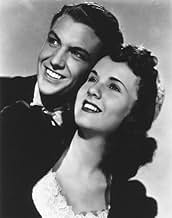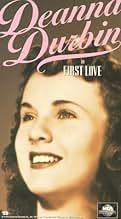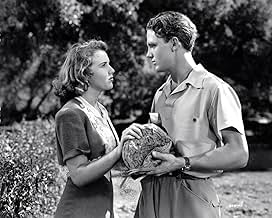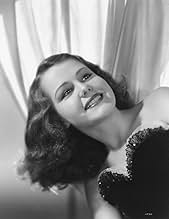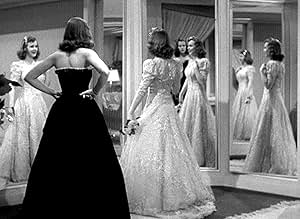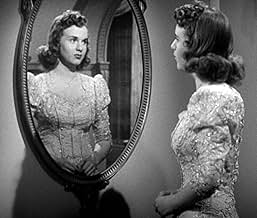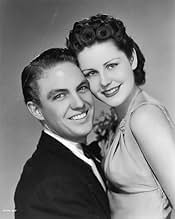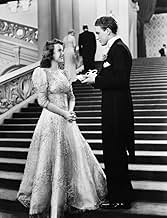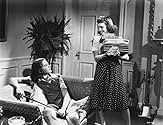Ajouter une intrigue dans votre langueAn orphaned boarding school graduate secretly attends a prestigious ball, where she falls for the boyfriend of her snobbish cousin.An orphaned boarding school graduate secretly attends a prestigious ball, where she falls for the boyfriend of her snobbish cousin.An orphaned boarding school graduate secretly attends a prestigious ball, where she falls for the boyfriend of her snobbish cousin.
- Réalisation
- Scénario
- Casting principal
- Nommé pour 2 Oscars
- 4 victoires et 2 nominations au total
Avis à la une
FIRST LOVE (Universal, 1939), directed by Henry Koster, stars Deanna Durbin in one of her ever popular movie roles. Basically a retelling of the old "Cinderella" story set in contemporary New York City, the youthful Durbin, making her sixth screen appearance, and Robert Stack, in movie debut, are supported by fine movie veterans, namely gravel voice Eugene Palette, Leatrice Joy (former lead actress of the silent screen), and Kathleen Howard in a small but important role as the crusty but wise old-maid school teacher with a heart of gold. Aside from her previous works opposite W.C. Fields in three classic comedies of the mid 1930s, this is one of the few times where Howard's talent as a true character actress is fully realized. And now back to Durbin's FIRST LOVE.
The plot begins at a high school graduation with the gathering of classmates receiving their diplomas, one being Constance "Connie" Harding (Deanna Durbin). With her parents dead and no relative in attendance, Connie is invited to spend the summer with her closest friend, Marcia (Marcia Mae Jones), but in good faith for all the financial support awarded her, she decides to stay with her uncle, James F. Clinton (Eugene Palette), a business tycoon, and his family. Afraid to face the challenge that awaits her, it is Miss Wiggens (Kathleen Howard), her former teacher, who encourages to move on, bringing hope and happiness to those around her. Although Connie does win over her uncle's servants, she's made to feel like an outsider by his wife, Grace (Leatrice Joy), spending much time studying astrology; Walter (Lewis Howard), their lazy son who'd rather be served than working; and Barbara (Helen Parrish), the stuck-up daughter who delights in giving orders and not taking them. Very much interested in high society's Ted Drake (Robert Stack), Barbara makes every effort keeping Connie away from him. Though invited to attend the ball with her mother and brother, and hope of meeting Ted again, Barbara purposely arranges for Connie to remain at home to entertain a visiting uncle from Washington during their absence. Feeling pity towards the disappointed Connie, the servants arrange having the family chauffeur (Jack Mulhall) purposely detain the Clintons by getting arrested while giving the opportunity for Connie to attend with the understanding she'd have to leave by midnight. After a grand evening with Ted, Connie, nearly forgetting the time, makes a hasty departure the very moment the Clintons arrive, leaving behind her one slipper found by Ted. When Barbara finds that Connie did attend the ball, their confrontation forces Connie to leave, causing Clinton, who cares for Connie, to become deeply ashamed for what his family has done.
In traditional thirties films depicting rich families, the Clintons in FIRST LOVE could very well be that of the Bullocks from the 1936 Universal comedy, MY MAN GODFREY, starring William Powell and Carole Lombard, each casting Eugene Palette as the millionaire with family he would rather forget. Instead of casting Alice Brady as the scatterbrained wife, Leatrice Joy is given the assignment, as did Lewis Howard's good-for-nothing son over Mischa Auer's freeloading protégé. There's no butler named Godfrey this time around, but good natured servants enacted by lesser known actors as Mary Treen (Agnes, the maid); Dorothy Vaughn (Ollie, the maid); Lucille Ward (The Cook); and Charles Coleman (George, the Butler). Other familiar faces as Frank Jenks (a Policeman and friend of the family servants); Samuel S. Hinds, Thurston Hall and Doris Lloyd fill in the void in lesser roles while Durbin highlights with her grand singing of "There's No Place Like Home," "Amapola." "Spring in My Heart" (by Johann Strauss) and "Un Bel Di" (One Fine Day) from Giacomo Puccini's "Madame Butterfly." Regardless of its title and Durbin's then publicized first screen kiss, FIRST LOVE is far from being trite formula. In fact, it's one of her and the studio's top productions of the year. Not having to resort to storybook fashion of "Cinderella," FIRST LOVE simply modernizes an old fairy tale, resulting to something quite original thanks to the fine screenplay, and natural, low-key performances by Durbin and Palette. Palette's great moment comes when he finally lets out steam telling off his selfish family, while Durbin adds humor during the ball by unwittingly stepping onto the platform in the place originally intended for another guest singer (Grace Hayle). There's also a touch of creativity in movie making in the ballroom sequence where all the guests virtually disappear in Connie's mind (and viewers) while dancing and conversing with Ted, and reappearing the very moment Connie returns to reality.
In spite of Durbin and her movies being the box office attractions at the time, presently appears to be of minor importance. Due to lack of television broadcasts since the 1980s, the time when FIRST LOVE had some exposure on public television, along with home video distribution in 1996, the Durbin products appear to be less popular due to its sugar sweet reputation. Having Durbin movies on DVD packages labeled "The Sweetheart Package" doesn't help matters either, yet looking back at these particular films whenever possible shows the entertaining values and certain star quality that has delighted audiences in an era so different from what's presented today. (***1/2)
The plot begins at a high school graduation with the gathering of classmates receiving their diplomas, one being Constance "Connie" Harding (Deanna Durbin). With her parents dead and no relative in attendance, Connie is invited to spend the summer with her closest friend, Marcia (Marcia Mae Jones), but in good faith for all the financial support awarded her, she decides to stay with her uncle, James F. Clinton (Eugene Palette), a business tycoon, and his family. Afraid to face the challenge that awaits her, it is Miss Wiggens (Kathleen Howard), her former teacher, who encourages to move on, bringing hope and happiness to those around her. Although Connie does win over her uncle's servants, she's made to feel like an outsider by his wife, Grace (Leatrice Joy), spending much time studying astrology; Walter (Lewis Howard), their lazy son who'd rather be served than working; and Barbara (Helen Parrish), the stuck-up daughter who delights in giving orders and not taking them. Very much interested in high society's Ted Drake (Robert Stack), Barbara makes every effort keeping Connie away from him. Though invited to attend the ball with her mother and brother, and hope of meeting Ted again, Barbara purposely arranges for Connie to remain at home to entertain a visiting uncle from Washington during their absence. Feeling pity towards the disappointed Connie, the servants arrange having the family chauffeur (Jack Mulhall) purposely detain the Clintons by getting arrested while giving the opportunity for Connie to attend with the understanding she'd have to leave by midnight. After a grand evening with Ted, Connie, nearly forgetting the time, makes a hasty departure the very moment the Clintons arrive, leaving behind her one slipper found by Ted. When Barbara finds that Connie did attend the ball, their confrontation forces Connie to leave, causing Clinton, who cares for Connie, to become deeply ashamed for what his family has done.
In traditional thirties films depicting rich families, the Clintons in FIRST LOVE could very well be that of the Bullocks from the 1936 Universal comedy, MY MAN GODFREY, starring William Powell and Carole Lombard, each casting Eugene Palette as the millionaire with family he would rather forget. Instead of casting Alice Brady as the scatterbrained wife, Leatrice Joy is given the assignment, as did Lewis Howard's good-for-nothing son over Mischa Auer's freeloading protégé. There's no butler named Godfrey this time around, but good natured servants enacted by lesser known actors as Mary Treen (Agnes, the maid); Dorothy Vaughn (Ollie, the maid); Lucille Ward (The Cook); and Charles Coleman (George, the Butler). Other familiar faces as Frank Jenks (a Policeman and friend of the family servants); Samuel S. Hinds, Thurston Hall and Doris Lloyd fill in the void in lesser roles while Durbin highlights with her grand singing of "There's No Place Like Home," "Amapola." "Spring in My Heart" (by Johann Strauss) and "Un Bel Di" (One Fine Day) from Giacomo Puccini's "Madame Butterfly." Regardless of its title and Durbin's then publicized first screen kiss, FIRST LOVE is far from being trite formula. In fact, it's one of her and the studio's top productions of the year. Not having to resort to storybook fashion of "Cinderella," FIRST LOVE simply modernizes an old fairy tale, resulting to something quite original thanks to the fine screenplay, and natural, low-key performances by Durbin and Palette. Palette's great moment comes when he finally lets out steam telling off his selfish family, while Durbin adds humor during the ball by unwittingly stepping onto the platform in the place originally intended for another guest singer (Grace Hayle). There's also a touch of creativity in movie making in the ballroom sequence where all the guests virtually disappear in Connie's mind (and viewers) while dancing and conversing with Ted, and reappearing the very moment Connie returns to reality.
In spite of Durbin and her movies being the box office attractions at the time, presently appears to be of minor importance. Due to lack of television broadcasts since the 1980s, the time when FIRST LOVE had some exposure on public television, along with home video distribution in 1996, the Durbin products appear to be less popular due to its sugar sweet reputation. Having Durbin movies on DVD packages labeled "The Sweetheart Package" doesn't help matters either, yet looking back at these particular films whenever possible shows the entertaining values and certain star quality that has delighted audiences in an era so different from what's presented today. (***1/2)
Two very young actors make up this cinderella story, Robert Stack (just 20) is the hero and Deanna at 18 still has quite a bit of puppy fat on her face (I didn't like the hair style - was it to make her seem older? ). She, an Orphan like Cinderella lands up in - not step mother here, but rich maternal uncle's home. Here of course there was one cousin, of the step-sister type the other cousin of opposite gender, the aunt and even the uncle are really not villainish by nature, but villain by the lack of empathy, not only towards our Cinderella, but towards the whole world.
There are of course nice songs too, has to be when Deanna is there. The movie is well made, and very watch-able, and of course the end is predictable in any fairy tale. Along with Deanna there are two more lovely girls, Helen Parish (the Cousin), a quite frequent co-actor of Deanna, and June Storey, another Canadian, both trying to win the Prince Charming.
There are two interesting things here, one puzzled me, till I understood what it was and other one, the main song, wasn't properly visualised.
If there is a call to sing a Strauss' waltz, even if you specify it is the Junior's, unless you know which one it is, no one can sing it. More so, it had been told to have a bit of modifications, some bars were changed, probably to cater to her voice-spectrum by the singer, Mme Cottellini, who was supposed to sing it, mentioned. Even more problem in it was, that even had she caught the opening, she still would have been in for a trouble, since it was a mix of three of Strauss' Waltzs, Schatz-Walzer, the beautiful Rosen aus dem Süden(the main body) and lagunen Walzer (finale) : unless one knows that, it would be impossible.
The interesting and wonder-ful (not necessary wonderful) portion was, after this waltz, when Deanna was dancing with Stack, I observed there was something in her left hand, what was it I wondered.... and then it struck me. That was the cloak-ticket. And she had retained it, held between the forefinger and middle finger of her hand, till she exchanged it for cloak. In fact she had been playing with it, even during the 'spring waltz'. This was unexpected that one would go for that much precision. I wonder who thought about it, Koster or Deanna ? I am sure the viewers won't have noticed it, or even wondered if it wasn't there (you could have some pocket or fold in the dress to keep it).
There are of course nice songs too, has to be when Deanna is there. The movie is well made, and very watch-able, and of course the end is predictable in any fairy tale. Along with Deanna there are two more lovely girls, Helen Parish (the Cousin), a quite frequent co-actor of Deanna, and June Storey, another Canadian, both trying to win the Prince Charming.
There are two interesting things here, one puzzled me, till I understood what it was and other one, the main song, wasn't properly visualised.
If there is a call to sing a Strauss' waltz, even if you specify it is the Junior's, unless you know which one it is, no one can sing it. More so, it had been told to have a bit of modifications, some bars were changed, probably to cater to her voice-spectrum by the singer, Mme Cottellini, who was supposed to sing it, mentioned. Even more problem in it was, that even had she caught the opening, she still would have been in for a trouble, since it was a mix of three of Strauss' Waltzs, Schatz-Walzer, the beautiful Rosen aus dem Süden(the main body) and lagunen Walzer (finale) : unless one knows that, it would be impossible.
The interesting and wonder-ful (not necessary wonderful) portion was, after this waltz, when Deanna was dancing with Stack, I observed there was something in her left hand, what was it I wondered.... and then it struck me. That was the cloak-ticket. And she had retained it, held between the forefinger and middle finger of her hand, till she exchanged it for cloak. In fact she had been playing with it, even during the 'spring waltz'. This was unexpected that one would go for that much precision. I wonder who thought about it, Koster or Deanna ? I am sure the viewers won't have noticed it, or even wondered if it wasn't there (you could have some pocket or fold in the dress to keep it).
Deanna Durbin stars with Robert Stack, Helen Parrish, Leatrice Joy, Eugene Palette, and Kathleen Howard in "First Love," a 1939 update of the Cinderella story, with Deanna receiving her first screen kiss.
I first had to get over seeing Robert Stack so young - omg.
Deanna plays Constance Harding, an orphan who is spending the summer after her graduation with relatives. It's a sterile household with her uncle (Pallette) who doesn't want any noise and prefers his family be out of the house when he's there; an unbelievable brat of a cousin, Barbara (Parrish); and an airhead aunt (Joy). The only warmth available comes from the servants.
While her mother is busy doing astrology charts, Barbara enjoys the life of a much-photographed socialite and woman about town who has a closet the length of one wall. She's after the most eligible bachelor in town, Ted Drake.
One day, she doesn't wake up when she is called at noon and instead gets up at 2. She is invited to go riding at 2:30 with Ted and some others. Because she will be late, she sends Constance to the country club to hold Ted there by any means necessary. Constance does as she's told, but develops a crush on Ted.
The family is then invited to a fabulous party at Ted's. The servants get together and buy Constance a beautiful dress, a corsage, and a wrap from someone's relative.
Barbara takes one look at her and makes up a reason why Constance needs to stay home -- something Barbara's brother knew was going to happen all along. But unseen forces are at work.
This is Deanna before my favorite part of her career, which is a little later. As a little girl, she was too energetic and her speaking voice too high-pitched for me.
Here, she is delightful, but her singing voice, particularly the top, is thin. Later on, it would open up and be glorious. And Un Bel Di in English - it sounded like they took the literal translation and just had her sing it, with the words not only awkward, but out of order. Not a good choice for her, as the aria is for a much bigger sound, though it fit in very well with the theme.
What made this film a bittersweet experience for me was the beautiful acting of Kathleen Howard as the old maid with a cane, Miss. Wiggins. In those days, if you weren't married, you were nobody, and Miss Wiggins, beloved by her students, exemplifies that.
You can tell by the way she talks that she believes life passed her by, but being a strong woman, she has gone on and made the best of it. The end frame of her made me cry. Such an affecting, poignant performance.
I loved this film. Deanna's first kiss garnered a lot of attention; later, the first kiss was tried with Shirley Temple, but in 1942 wartime, no one cared.
I first had to get over seeing Robert Stack so young - omg.
Deanna plays Constance Harding, an orphan who is spending the summer after her graduation with relatives. It's a sterile household with her uncle (Pallette) who doesn't want any noise and prefers his family be out of the house when he's there; an unbelievable brat of a cousin, Barbara (Parrish); and an airhead aunt (Joy). The only warmth available comes from the servants.
While her mother is busy doing astrology charts, Barbara enjoys the life of a much-photographed socialite and woman about town who has a closet the length of one wall. She's after the most eligible bachelor in town, Ted Drake.
One day, she doesn't wake up when she is called at noon and instead gets up at 2. She is invited to go riding at 2:30 with Ted and some others. Because she will be late, she sends Constance to the country club to hold Ted there by any means necessary. Constance does as she's told, but develops a crush on Ted.
The family is then invited to a fabulous party at Ted's. The servants get together and buy Constance a beautiful dress, a corsage, and a wrap from someone's relative.
Barbara takes one look at her and makes up a reason why Constance needs to stay home -- something Barbara's brother knew was going to happen all along. But unseen forces are at work.
This is Deanna before my favorite part of her career, which is a little later. As a little girl, she was too energetic and her speaking voice too high-pitched for me.
Here, she is delightful, but her singing voice, particularly the top, is thin. Later on, it would open up and be glorious. And Un Bel Di in English - it sounded like they took the literal translation and just had her sing it, with the words not only awkward, but out of order. Not a good choice for her, as the aria is for a much bigger sound, though it fit in very well with the theme.
What made this film a bittersweet experience for me was the beautiful acting of Kathleen Howard as the old maid with a cane, Miss. Wiggins. In those days, if you weren't married, you were nobody, and Miss Wiggins, beloved by her students, exemplifies that.
You can tell by the way she talks that she believes life passed her by, but being a strong woman, she has gone on and made the best of it. The end frame of her made me cry. Such an affecting, poignant performance.
I loved this film. Deanna's first kiss garnered a lot of attention; later, the first kiss was tried with Shirley Temple, but in 1942 wartime, no one cared.
I'll take my Cinderella with Prokovief, but after watching First Love, a first-rate film with a quease-inducing title, I'll place this Deanna Durbin vehicle second.
"You go up there to New York," says Miss Wiggins, a crotchety, spinster music teacher, to Connie Harding, who has just graduated from a fancy private school. "Make those people love you just as much as we do." Connie is an orphan, and Miss Wiggins is referring to her uncle and his family, wealthy New Yorkers who have paid all her bills but were just too busy to drive down for her graduation. They sent one of the family's limousines for her. "And then," Miss Wiggins says, "maybe, someday, you will meet a prince, and you'll live happily ever after."
"Those fairy stories haven't come true for over 100 years, Miss Wiggins," Connie says.
Miss Wiggins thumps the floor with her cane. "Fiddlesticks! We just have to dust them off...streamline them a bit."
And this is what director Henry Koster, one of the best of Durbin's directors, has managed to do. He is aided immeasurably by a clever script ("This is terrible," says Barbara, Connie's awful cousin, "I can't be more than an hour and a half late to Wilma's party...she's one of my personal friends!") and solid, pungent performances by some very good character actors. The story's sweetness is genuine, based on the intrinsic sympathy for a young girl who manages to overcome obstacles with the help of others, and then finds happiness. Deanna Durbin at 18 is an intriguing combination of naturalness and skill. We like her the moment we see her, and her ability to win us over is enhanced when we meet the family. Her uncle (Eugene Palette) is a gruff man who seemingly only wants to keep far away from his wife and children, as well as away from Connie. When we meet the rest of the family, we sympathize with him. His wife (Leatrice Joy) is unpleasantly scatter-brained. His daughter (Helen Parish), a year older than Connie, is a snobbish, selfish, manipulating terror. His son (Lewis Howard) is so languid he make laziness seem tiring.
There's a lavish ball, and Connie gets to go thanks to the intervention of the servants, led by that great butler-playing specialist, Charles Coleman. She meets a prince of a wealthy young man, Ted Drake (whom she met once before with mud on her face). When they waltz at the ball, all the other dancers fade away in a clever bit of instant love setting by Koster. Then Durbin receives her first screen kiss, from Robert Stack as Ted, as naturally as she acts. After the usual ups and downs for Cinderella, there's a happy ending which involves a matching slipper. Her uncle becomes the worm who turns, dealing brisk and satisfying retribution to his family, and even Miss Wiggins smiles. We are assured that Connie and Ted live happily ever after.
Durbin sings two or three songs, including the hoary old tear-jerker "There's No Place Like Home." More impressively, she sings "Un Bel Di." Impressively, because not many 18-year- olds I've heard of would be able to handle the emotions Puccini lays on with such a trowel. The aria is a tear-jerker, too, but a great one. It takes a singer who knows what she's doing to handle the emotions (in Italian) as well as the notes. Durbin carries it off impressively with her usual uncanny poise.
First Love, except for that title, is completely and satisfyingly charming.
"You go up there to New York," says Miss Wiggins, a crotchety, spinster music teacher, to Connie Harding, who has just graduated from a fancy private school. "Make those people love you just as much as we do." Connie is an orphan, and Miss Wiggins is referring to her uncle and his family, wealthy New Yorkers who have paid all her bills but were just too busy to drive down for her graduation. They sent one of the family's limousines for her. "And then," Miss Wiggins says, "maybe, someday, you will meet a prince, and you'll live happily ever after."
"Those fairy stories haven't come true for over 100 years, Miss Wiggins," Connie says.
Miss Wiggins thumps the floor with her cane. "Fiddlesticks! We just have to dust them off...streamline them a bit."
And this is what director Henry Koster, one of the best of Durbin's directors, has managed to do. He is aided immeasurably by a clever script ("This is terrible," says Barbara, Connie's awful cousin, "I can't be more than an hour and a half late to Wilma's party...she's one of my personal friends!") and solid, pungent performances by some very good character actors. The story's sweetness is genuine, based on the intrinsic sympathy for a young girl who manages to overcome obstacles with the help of others, and then finds happiness. Deanna Durbin at 18 is an intriguing combination of naturalness and skill. We like her the moment we see her, and her ability to win us over is enhanced when we meet the family. Her uncle (Eugene Palette) is a gruff man who seemingly only wants to keep far away from his wife and children, as well as away from Connie. When we meet the rest of the family, we sympathize with him. His wife (Leatrice Joy) is unpleasantly scatter-brained. His daughter (Helen Parish), a year older than Connie, is a snobbish, selfish, manipulating terror. His son (Lewis Howard) is so languid he make laziness seem tiring.
There's a lavish ball, and Connie gets to go thanks to the intervention of the servants, led by that great butler-playing specialist, Charles Coleman. She meets a prince of a wealthy young man, Ted Drake (whom she met once before with mud on her face). When they waltz at the ball, all the other dancers fade away in a clever bit of instant love setting by Koster. Then Durbin receives her first screen kiss, from Robert Stack as Ted, as naturally as she acts. After the usual ups and downs for Cinderella, there's a happy ending which involves a matching slipper. Her uncle becomes the worm who turns, dealing brisk and satisfying retribution to his family, and even Miss Wiggins smiles. We are assured that Connie and Ted live happily ever after.
Durbin sings two or three songs, including the hoary old tear-jerker "There's No Place Like Home." More impressively, she sings "Un Bel Di." Impressively, because not many 18-year- olds I've heard of would be able to handle the emotions Puccini lays on with such a trowel. The aria is a tear-jerker, too, but a great one. It takes a singer who knows what she's doing to handle the emotions (in Italian) as well as the notes. Durbin carries it off impressively with her usual uncanny poise.
First Love, except for that title, is completely and satisfyingly charming.
"First Love" was a major transition for Universal star Deanna Durbin, as she was being positioned to shift from child star to engenue (something that Fox was inevitably unable to accomplish with Shirley Temple at the same time). While the film is not an overblown epic, it's lavish in the details, and carefully produced to give the whole piece a maximum of charm. To today's audiences, it might be a bit saccharine, but if you can dial down the cynicism of our age, the film's positive points grow.
Durbin plays much more subtly in this film than she had in many of her earlier films--signalling that she was now "maturer" instead of being a juvenile whirlwind ball of energy like she had been in "Three Smart Girls" and "100 Men and a Girl." Her beau, played by an impossibly young (and almost scarily good looking) Robert Stack, gives Durbin her first screen kiss--a source of major publicity for the film at the time.
The story is an updated Cinderella/screwball comedy, which nevertheless allows Durbin's character to break out into a few operatic arias throughout the film (this also takes some getting used to for modern audiences). The most memorable part of the film, suitably, happens during "the ball," where Durbin and Stack dance for the first time. Employing a charming idea, a shot of a crowded dance floor dissolves to a shot of just the duo dancing, to imply how the pair are so involved with each other that the rest of the world has faded away. If you like stuff like this, then you'll revel in the rest of the film.
Durbin plays much more subtly in this film than she had in many of her earlier films--signalling that she was now "maturer" instead of being a juvenile whirlwind ball of energy like she had been in "Three Smart Girls" and "100 Men and a Girl." Her beau, played by an impossibly young (and almost scarily good looking) Robert Stack, gives Durbin her first screen kiss--a source of major publicity for the film at the time.
The story is an updated Cinderella/screwball comedy, which nevertheless allows Durbin's character to break out into a few operatic arias throughout the film (this also takes some getting used to for modern audiences). The most memorable part of the film, suitably, happens during "the ball," where Durbin and Stack dance for the first time. Employing a charming idea, a shot of a crowded dance floor dissolves to a shot of just the duo dancing, to imply how the pair are so involved with each other that the rest of the world has faded away. If you like stuff like this, then you'll revel in the rest of the film.
Le saviez-vous
- AnecdotesDeanna Durbin's character gives her birthdate as 4 December - Durbin's own.
- GaffesThe movement of Deanna during the scene with her mirror.
- Citations
Miss Wiggins: The trouble with you young people is you don't believe in anything. You're afraid, afraid of hope, afraid of happiness.
- ConnexionsFeatured in Liens éternels (1943)
Meilleurs choix
Connectez-vous pour évaluer et suivre la liste de favoris afin de recevoir des recommandations personnalisées
- How long is First Love?Alimenté par Alexa
Détails
- Durée
- 1h 24min(84 min)
- Couleur
- Rapport de forme
- 1.37 : 1
Contribuer à cette page
Suggérer une modification ou ajouter du contenu manquant

